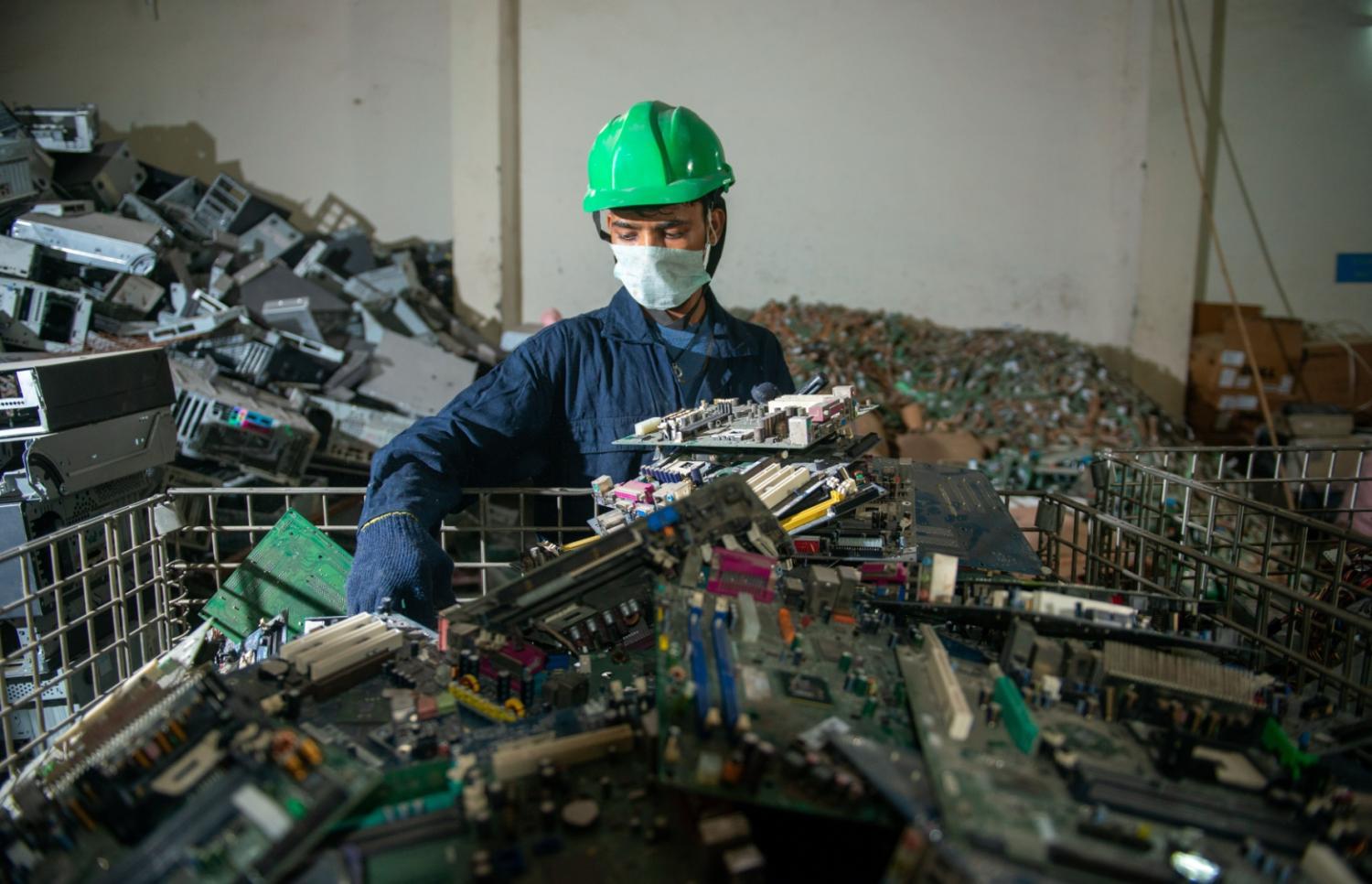This is a Brookings Center on Regulation and Markets working paper.
Introduction
Collaborating across the private, public, and nonprofit sectors is critical for addressing environmental and social grand challenges (Doh et al., 2019; Selsky & Parker, 2005; Griffin, 2021). Yet, in developing countries collaborating with indigenous experts in informal sector organizations—the collection of firms, workers, and activities operating outside legal or regulatory frameworks (Loayza, 2016)—is likely required to address entrenched environmental challenges.
Workers and organizations in the informal sector are often overlooked as collaborators or partners (Austin, 1990; Austin & Seitanidi, 2012a, 2012b) because they may be considered too inefficient for, or shut out from, formal sector jobs (Alvarez & Barney, 2014; La Porta & Shleifer, 2014). This further complicates complex partnerships. In addition, viewing informal sector workers as under- or un-educated entrepreneurs without state-provided basic needs (Alvarez & Barney, 2014; La Porta & Shleifer, 2014) stands in contrast to viewing informal sector organizations as having unique knowledge, unmatched skills, and time-tested, relational advantages (Shepherd et al., 2022). All in all, the limited understanding of the informal sector as a viable partner in addressing grand challenges suggests a need for a more nuanced scholarly examination (Ault & Spicer, 2022; Doh et al., 2016; Doh et al., 2019; Jackson 2013; Jamali et al., 2017; Wickert et al., 2021).
In this study, we examine the role of collaborations with informal sector organizations in India’s electronic waste (e-waste) management system. We find that informal sector organizations are both fierce competitors and critically needed collaborators, despite being legally shut out of India’s e-waste process. That is, regulatory officials (e.g., India’s central pollution regulator, the Central Pollution Control Board (CPCB)) do not mention the informal sector nor their pervasive role in mitigation and remediation (Telangana State Pollution Control Board [TSPCB], 2018). Without formal recognition by the authorities, informal sector individuals and families operate outside legal and regulatory frameworks (Austin, 1990; Loayza, 2016) yet are considered critical collaborators (Turaga & Bhaskar, 2019). This lack of formal recognition is one of several challenges we identify when firms partner with the informal sector to address India’s e-waste challenges.
Further, we suggest that collaborations with the informal sector exacerbate many partnership challenges while easing others (e.g., being “invisible” or “under the radar” attracting less scrutiny). In addition, India’s e-waste informal sector organizations’ time-tested familiarity with, and frequency of, collaborating may emerge as a unique strength of resilience. This creates a situation in which the presence and pervasiveness of informal sector organizations can complicate national policy, for example. We found that informal organizations have unique skill sets and relationships that can handle entrenched e-waste challenges. As such, informal sector organizations have a comparative advantage as low-cost buyers and suppliers (Austin, 1990; Prahalad & Hart, 2004) but remain unrecognized actors.
Our study begins to address the gap in scholarly understanding of the informal sector as incommensurate with its importance (Bruton et al. 2012; Darbi et al., 2018), pervasiveness (Austin, 1990), and myriad impacts (Wickert et al., 2021). We attempt to provide “in-depth knowledge of the relationships between the formal and the informal businesses” (Darbi et al., 2018, p. 306) as part of a grounded understanding (Jamali et al., 2017) of collaborations within a developing country context involving informal sector organizations.
In this paper, we explore the complex pressures constraining and enabling collaborations (Jamali et al., 2017) with the informal sector via a grounded understanding1 (Jamali & Karam, 2018). We start by identifying the importance and pervasiveness of India’s informal sector organizations—the waste pickers and ragpickers—as central to turning an entrenched e-waste challenge into socially and environmentally desirable outcomes. Without active informal sector engagement, we believe India’s e-waste regulatory aspirations will remain stymied.
More specifically, we examine the informal sector involvement across India’s e-waste management system over several years with a particular focus on the emergent organizations—the producer responsibility organizations (PROs)—bridging the tax-paying formal sector and the unrecognized, largely cash-based entities in the informal sector. We find that, counterintuitively, informal sector organizations may be effective, nimble, and fierce competitors to formal sector organizations. As a result, we find an important role for India’s PROs, an entity that bridges the demands of formal sector entities (producers, recyclers, and governmental officials) with the capabilities of informal sector organizations in providing low-cost volumes of recycled and/or recyclable materials.
Our paper is structured as follows. We review the literature on informal sector organizations partnerships in developing countries. Then, we describe India’s e-waste management system. In the fourth section, we explain our mixed methods methodology to develop a grounded understanding (Jamali & Karam, 2018) of informal sector organization involvement across India’s e-waste system, over time. In the fifth section, we discuss the results, limitations, and implications of effective partnering while highlighting the importance of India’s newly emergent PROs that bridge formal sector demands with informal sector capabilities. Finally, we conclude with suggestions for expanding e-waste policy, at scale, and recommendations for collaborating with the informal sector, more broadly.
-
Acknowledgements and disclosures
Radulovic is a member of Sustainable Electronics Recycling International’s Board of Directors. The authors did not receive financial support from any firm or person for this article or from any firm or person with a financial or political interest in this article. Other than the aforementioned, they are currently not an officer, director, or board member of any organization with an interest in this article.
-
Footnotes
- Rather than examining collaborations, in theory, a grounded understanding suggests the context matters. Thus, we were in the field with the informal sector communities, producer responsibility organizations (PROs), producers, and others to make firsthand observations of e-waste handlers with semi-structured interviews.
The Brookings Institution is committed to quality, independence, and impact.
We are supported by a diverse array of funders. In line with our values and policies, each Brookings publication represents the sole views of its author(s).






